Application of Benner's Novice to Expert Theory in Nursing (GCNNK1)
VerifiedAdded on 2023/01/23
|7
|2161
|47
Essay
AI Summary
This essay provides a comprehensive overview of Patricia Benner's Novice to Expert theory, a foundational concept in nursing professional development. It outlines the five stages of skill acquisition: novice, advanced beginner, competent, proficient, and expert, emphasizing the importance of experience and education in developing nursing expertise. The essay explores how Benner's theory is integrated into nursing practice, including educational curricula, clinical placements, nurse registration processes, and career advancement pathways. It highlights the significance of theoretical knowledge, clinical application, and years of experience in shaping competent and proficient nurses. Furthermore, the essay discusses how the theory guides the development of expert nurses who can effectively manage complex situations and provide holistic, patient-centered care, as supported by current literature.

UNIT:
NAME:
DATE:
NAME:
DATE:
Paraphrase This Document
Need a fresh take? Get an instant paraphrase of this document with our AI Paraphraser
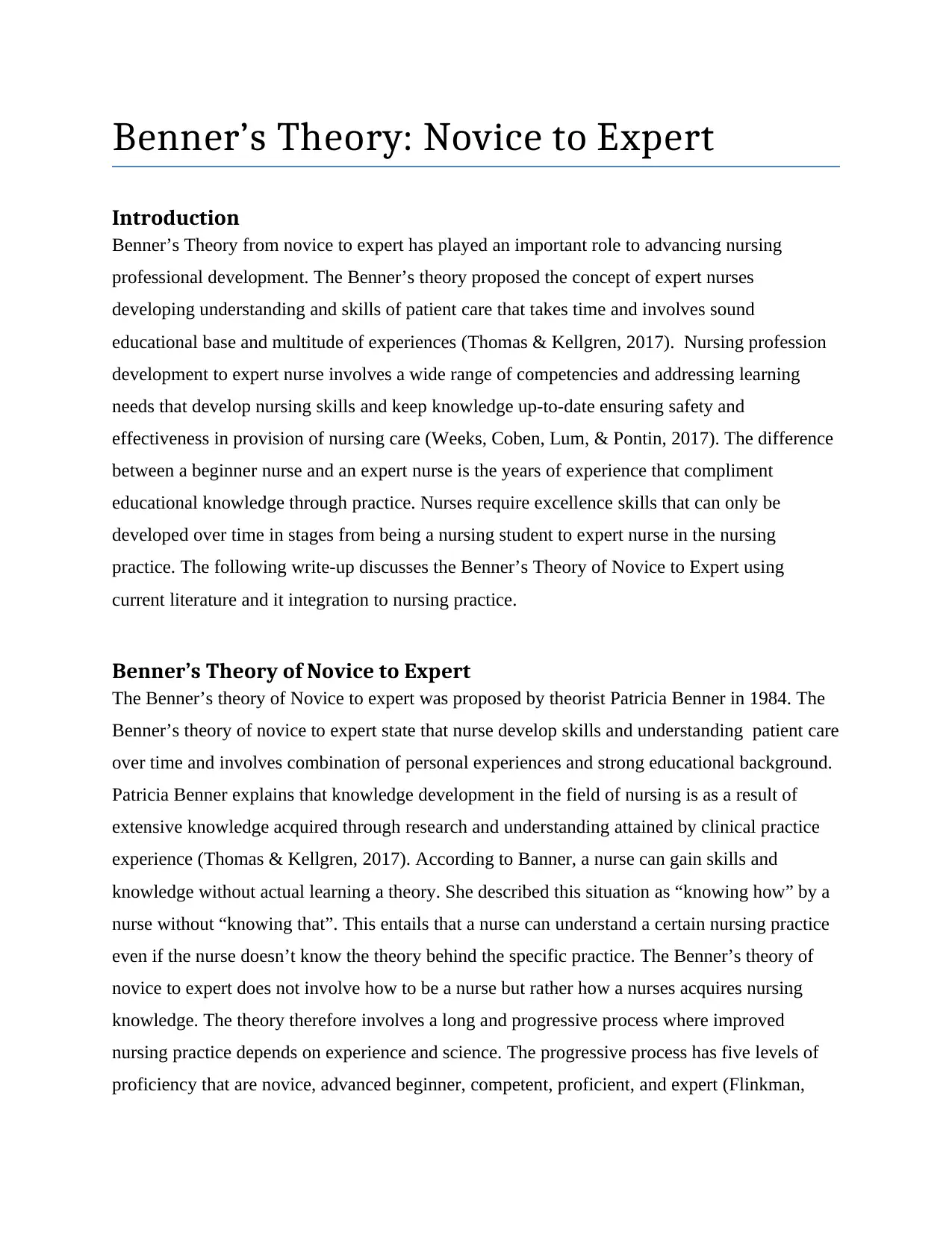
Benner’s Theory: Novice to Expert
Introduction
Benner’s Theory from novice to expert has played an important role to advancing nursing
professional development. The Benner’s theory proposed the concept of expert nurses
developing understanding and skills of patient care that takes time and involves sound
educational base and multitude of experiences (Thomas & Kellgren, 2017). Nursing profession
development to expert nurse involves a wide range of competencies and addressing learning
needs that develop nursing skills and keep knowledge up-to-date ensuring safety and
effectiveness in provision of nursing care (Weeks, Coben, Lum, & Pontin, 2017). The difference
between a beginner nurse and an expert nurse is the years of experience that compliment
educational knowledge through practice. Nurses require excellence skills that can only be
developed over time in stages from being a nursing student to expert nurse in the nursing
practice. The following write-up discusses the Benner’s Theory of Novice to Expert using
current literature and it integration to nursing practice.
Benner’s Theory of Novice to Expert
The Benner’s theory of Novice to expert was proposed by theorist Patricia Benner in 1984. The
Benner’s theory of novice to expert state that nurse develop skills and understanding patient care
over time and involves combination of personal experiences and strong educational background.
Patricia Benner explains that knowledge development in the field of nursing is as a result of
extensive knowledge acquired through research and understanding attained by clinical practice
experience (Thomas & Kellgren, 2017). According to Banner, a nurse can gain skills and
knowledge without actual learning a theory. She described this situation as “knowing how” by a
nurse without “knowing that”. This entails that a nurse can understand a certain nursing practice
even if the nurse doesn’t know the theory behind the specific practice. The Benner’s theory of
novice to expert does not involve how to be a nurse but rather how a nurses acquires nursing
knowledge. The theory therefore involves a long and progressive process where improved
nursing practice depends on experience and science. The progressive process has five levels of
proficiency that are novice, advanced beginner, competent, proficient, and expert (Flinkman,
Introduction
Benner’s Theory from novice to expert has played an important role to advancing nursing
professional development. The Benner’s theory proposed the concept of expert nurses
developing understanding and skills of patient care that takes time and involves sound
educational base and multitude of experiences (Thomas & Kellgren, 2017). Nursing profession
development to expert nurse involves a wide range of competencies and addressing learning
needs that develop nursing skills and keep knowledge up-to-date ensuring safety and
effectiveness in provision of nursing care (Weeks, Coben, Lum, & Pontin, 2017). The difference
between a beginner nurse and an expert nurse is the years of experience that compliment
educational knowledge through practice. Nurses require excellence skills that can only be
developed over time in stages from being a nursing student to expert nurse in the nursing
practice. The following write-up discusses the Benner’s Theory of Novice to Expert using
current literature and it integration to nursing practice.
Benner’s Theory of Novice to Expert
The Benner’s theory of Novice to expert was proposed by theorist Patricia Benner in 1984. The
Benner’s theory of novice to expert state that nurse develop skills and understanding patient care
over time and involves combination of personal experiences and strong educational background.
Patricia Benner explains that knowledge development in the field of nursing is as a result of
extensive knowledge acquired through research and understanding attained by clinical practice
experience (Thomas & Kellgren, 2017). According to Banner, a nurse can gain skills and
knowledge without actual learning a theory. She described this situation as “knowing how” by a
nurse without “knowing that”. This entails that a nurse can understand a certain nursing practice
even if the nurse doesn’t know the theory behind the specific practice. The Benner’s theory of
novice to expert does not involve how to be a nurse but rather how a nurses acquires nursing
knowledge. The theory therefore involves a long and progressive process where improved
nursing practice depends on experience and science. The progressive process has five levels of
proficiency that are novice, advanced beginner, competent, proficient, and expert (Flinkman,
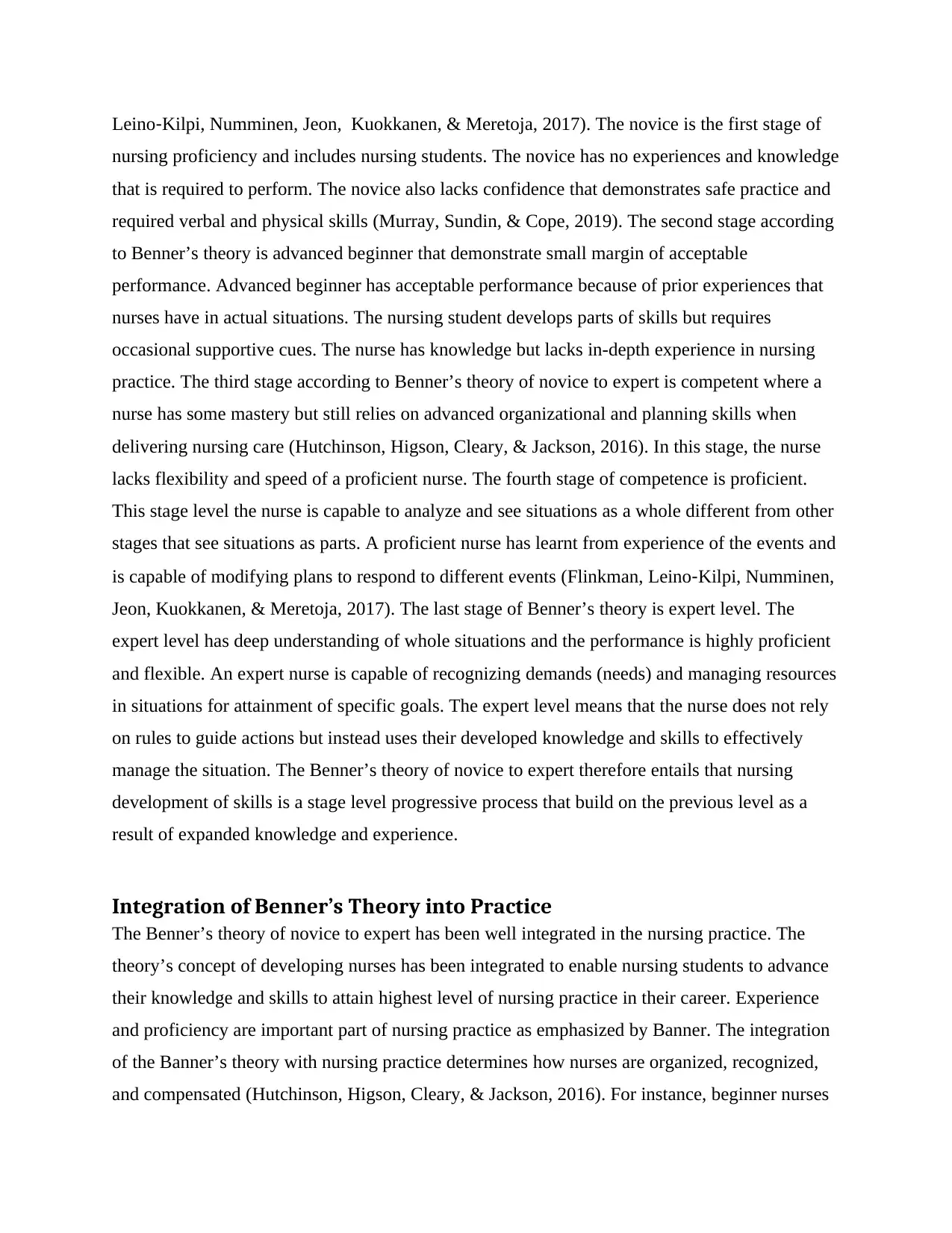
Leino‐Kilpi, Numminen, Jeon, Kuokkanen, & Meretoja, 2017). The novice is the first stage of
nursing proficiency and includes nursing students. The novice has no experiences and knowledge
that is required to perform. The novice also lacks confidence that demonstrates safe practice and
required verbal and physical skills (Murray, Sundin, & Cope, 2019). The second stage according
to Benner’s theory is advanced beginner that demonstrate small margin of acceptable
performance. Advanced beginner has acceptable performance because of prior experiences that
nurses have in actual situations. The nursing student develops parts of skills but requires
occasional supportive cues. The nurse has knowledge but lacks in-depth experience in nursing
practice. The third stage according to Benner’s theory of novice to expert is competent where a
nurse has some mastery but still relies on advanced organizational and planning skills when
delivering nursing care (Hutchinson, Higson, Cleary, & Jackson, 2016). In this stage, the nurse
lacks flexibility and speed of a proficient nurse. The fourth stage of competence is proficient.
This stage level the nurse is capable to analyze and see situations as a whole different from other
stages that see situations as parts. A proficient nurse has learnt from experience of the events and
is capable of modifying plans to respond to different events (Flinkman, Leino‐Kilpi, Numminen,
Jeon, Kuokkanen, & Meretoja, 2017). The last stage of Benner’s theory is expert level. The
expert level has deep understanding of whole situations and the performance is highly proficient
and flexible. An expert nurse is capable of recognizing demands (needs) and managing resources
in situations for attainment of specific goals. The expert level means that the nurse does not rely
on rules to guide actions but instead uses their developed knowledge and skills to effectively
manage the situation. The Benner’s theory of novice to expert therefore entails that nursing
development of skills is a stage level progressive process that build on the previous level as a
result of expanded knowledge and experience.
Integration of Benner’s Theory into Practice
The Benner’s theory of novice to expert has been well integrated in the nursing practice. The
theory’s concept of developing nurses has been integrated to enable nursing students to advance
their knowledge and skills to attain highest level of nursing practice in their career. Experience
and proficiency are important part of nursing practice as emphasized by Banner. The integration
of the Banner’s theory with nursing practice determines how nurses are organized, recognized,
and compensated (Hutchinson, Higson, Cleary, & Jackson, 2016). For instance, beginner nurses
nursing proficiency and includes nursing students. The novice has no experiences and knowledge
that is required to perform. The novice also lacks confidence that demonstrates safe practice and
required verbal and physical skills (Murray, Sundin, & Cope, 2019). The second stage according
to Benner’s theory is advanced beginner that demonstrate small margin of acceptable
performance. Advanced beginner has acceptable performance because of prior experiences that
nurses have in actual situations. The nursing student develops parts of skills but requires
occasional supportive cues. The nurse has knowledge but lacks in-depth experience in nursing
practice. The third stage according to Benner’s theory of novice to expert is competent where a
nurse has some mastery but still relies on advanced organizational and planning skills when
delivering nursing care (Hutchinson, Higson, Cleary, & Jackson, 2016). In this stage, the nurse
lacks flexibility and speed of a proficient nurse. The fourth stage of competence is proficient.
This stage level the nurse is capable to analyze and see situations as a whole different from other
stages that see situations as parts. A proficient nurse has learnt from experience of the events and
is capable of modifying plans to respond to different events (Flinkman, Leino‐Kilpi, Numminen,
Jeon, Kuokkanen, & Meretoja, 2017). The last stage of Benner’s theory is expert level. The
expert level has deep understanding of whole situations and the performance is highly proficient
and flexible. An expert nurse is capable of recognizing demands (needs) and managing resources
in situations for attainment of specific goals. The expert level means that the nurse does not rely
on rules to guide actions but instead uses their developed knowledge and skills to effectively
manage the situation. The Benner’s theory of novice to expert therefore entails that nursing
development of skills is a stage level progressive process that build on the previous level as a
result of expanded knowledge and experience.
Integration of Benner’s Theory into Practice
The Benner’s theory of novice to expert has been well integrated in the nursing practice. The
theory’s concept of developing nurses has been integrated to enable nursing students to advance
their knowledge and skills to attain highest level of nursing practice in their career. Experience
and proficiency are important part of nursing practice as emphasized by Banner. The integration
of the Banner’s theory with nursing practice determines how nurses are organized, recognized,
and compensated (Hutchinson, Higson, Cleary, & Jackson, 2016). For instance, beginner nurses
⊘ This is a preview!⊘
Do you want full access?
Subscribe today to unlock all pages.

Trusted by 1+ million students worldwide
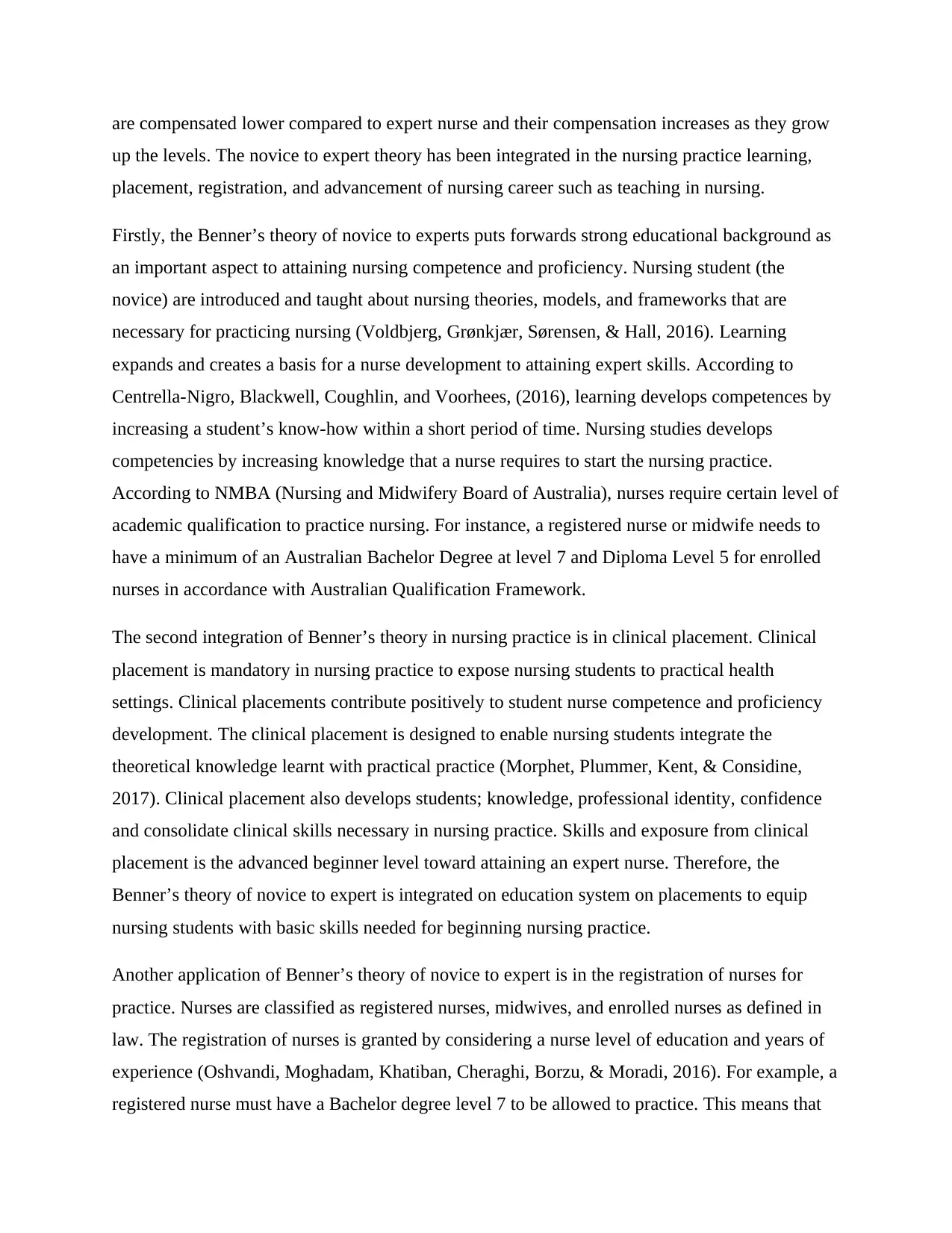
are compensated lower compared to expert nurse and their compensation increases as they grow
up the levels. The novice to expert theory has been integrated in the nursing practice learning,
placement, registration, and advancement of nursing career such as teaching in nursing.
Firstly, the Benner’s theory of novice to experts puts forwards strong educational background as
an important aspect to attaining nursing competence and proficiency. Nursing student (the
novice) are introduced and taught about nursing theories, models, and frameworks that are
necessary for practicing nursing (Voldbjerg, Grønkjær, Sørensen, & Hall, 2016). Learning
expands and creates a basis for a nurse development to attaining expert skills. According to
Centrella-Nigro, Blackwell, Coughlin, and Voorhees, (2016), learning develops competences by
increasing a student’s know-how within a short period of time. Nursing studies develops
competencies by increasing knowledge that a nurse requires to start the nursing practice.
According to NMBA (Nursing and Midwifery Board of Australia), nurses require certain level of
academic qualification to practice nursing. For instance, a registered nurse or midwife needs to
have a minimum of an Australian Bachelor Degree at level 7 and Diploma Level 5 for enrolled
nurses in accordance with Australian Qualification Framework.
The second integration of Benner’s theory in nursing practice is in clinical placement. Clinical
placement is mandatory in nursing practice to expose nursing students to practical health
settings. Clinical placements contribute positively to student nurse competence and proficiency
development. The clinical placement is designed to enable nursing students integrate the
theoretical knowledge learnt with practical practice (Morphet, Plummer, Kent, & Considine,
2017). Clinical placement also develops students; knowledge, professional identity, confidence
and consolidate clinical skills necessary in nursing practice. Skills and exposure from clinical
placement is the advanced beginner level toward attaining an expert nurse. Therefore, the
Benner’s theory of novice to expert is integrated on education system on placements to equip
nursing students with basic skills needed for beginning nursing practice.
Another application of Benner’s theory of novice to expert is in the registration of nurses for
practice. Nurses are classified as registered nurses, midwives, and enrolled nurses as defined in
law. The registration of nurses is granted by considering a nurse level of education and years of
experience (Oshvandi, Moghadam, Khatiban, Cheraghi, Borzu, & Moradi, 2016). For example, a
registered nurse must have a Bachelor degree level 7 to be allowed to practice. This means that
up the levels. The novice to expert theory has been integrated in the nursing practice learning,
placement, registration, and advancement of nursing career such as teaching in nursing.
Firstly, the Benner’s theory of novice to experts puts forwards strong educational background as
an important aspect to attaining nursing competence and proficiency. Nursing student (the
novice) are introduced and taught about nursing theories, models, and frameworks that are
necessary for practicing nursing (Voldbjerg, Grønkjær, Sørensen, & Hall, 2016). Learning
expands and creates a basis for a nurse development to attaining expert skills. According to
Centrella-Nigro, Blackwell, Coughlin, and Voorhees, (2016), learning develops competences by
increasing a student’s know-how within a short period of time. Nursing studies develops
competencies by increasing knowledge that a nurse requires to start the nursing practice.
According to NMBA (Nursing and Midwifery Board of Australia), nurses require certain level of
academic qualification to practice nursing. For instance, a registered nurse or midwife needs to
have a minimum of an Australian Bachelor Degree at level 7 and Diploma Level 5 for enrolled
nurses in accordance with Australian Qualification Framework.
The second integration of Benner’s theory in nursing practice is in clinical placement. Clinical
placement is mandatory in nursing practice to expose nursing students to practical health
settings. Clinical placements contribute positively to student nurse competence and proficiency
development. The clinical placement is designed to enable nursing students integrate the
theoretical knowledge learnt with practical practice (Morphet, Plummer, Kent, & Considine,
2017). Clinical placement also develops students; knowledge, professional identity, confidence
and consolidate clinical skills necessary in nursing practice. Skills and exposure from clinical
placement is the advanced beginner level toward attaining an expert nurse. Therefore, the
Benner’s theory of novice to expert is integrated on education system on placements to equip
nursing students with basic skills needed for beginning nursing practice.
Another application of Benner’s theory of novice to expert is in the registration of nurses for
practice. Nurses are classified as registered nurses, midwives, and enrolled nurses as defined in
law. The registration of nurses is granted by considering a nurse level of education and years of
experience (Oshvandi, Moghadam, Khatiban, Cheraghi, Borzu, & Moradi, 2016). For example, a
registered nurse must have a Bachelor degree level 7 to be allowed to practice. This means that
Paraphrase This Document
Need a fresh take? Get an instant paraphrase of this document with our AI Paraphraser
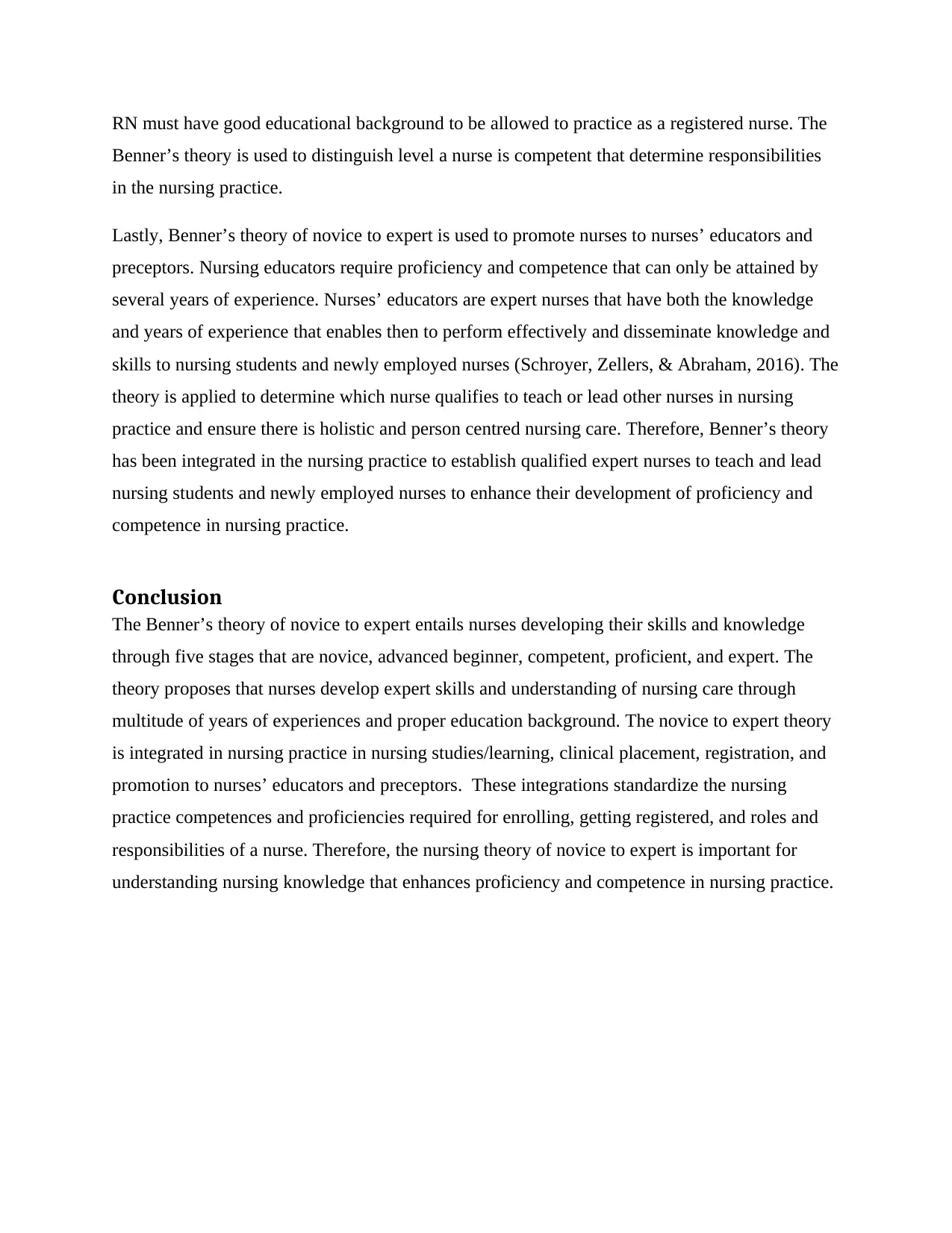
RN must have good educational background to be allowed to practice as a registered nurse. The
Benner’s theory is used to distinguish level a nurse is competent that determine responsibilities
in the nursing practice.
Lastly, Benner’s theory of novice to expert is used to promote nurses to nurses’ educators and
preceptors. Nursing educators require proficiency and competence that can only be attained by
several years of experience. Nurses’ educators are expert nurses that have both the knowledge
and years of experience that enables then to perform effectively and disseminate knowledge and
skills to nursing students and newly employed nurses (Schroyer, Zellers, & Abraham, 2016). The
theory is applied to determine which nurse qualifies to teach or lead other nurses in nursing
practice and ensure there is holistic and person centred nursing care. Therefore, Benner’s theory
has been integrated in the nursing practice to establish qualified expert nurses to teach and lead
nursing students and newly employed nurses to enhance their development of proficiency and
competence in nursing practice.
Conclusion
The Benner’s theory of novice to expert entails nurses developing their skills and knowledge
through five stages that are novice, advanced beginner, competent, proficient, and expert. The
theory proposes that nurses develop expert skills and understanding of nursing care through
multitude of years of experiences and proper education background. The novice to expert theory
is integrated in nursing practice in nursing studies/learning, clinical placement, registration, and
promotion to nurses’ educators and preceptors. These integrations standardize the nursing
practice competences and proficiencies required for enrolling, getting registered, and roles and
responsibilities of a nurse. Therefore, the nursing theory of novice to expert is important for
understanding nursing knowledge that enhances proficiency and competence in nursing practice.
Benner’s theory is used to distinguish level a nurse is competent that determine responsibilities
in the nursing practice.
Lastly, Benner’s theory of novice to expert is used to promote nurses to nurses’ educators and
preceptors. Nursing educators require proficiency and competence that can only be attained by
several years of experience. Nurses’ educators are expert nurses that have both the knowledge
and years of experience that enables then to perform effectively and disseminate knowledge and
skills to nursing students and newly employed nurses (Schroyer, Zellers, & Abraham, 2016). The
theory is applied to determine which nurse qualifies to teach or lead other nurses in nursing
practice and ensure there is holistic and person centred nursing care. Therefore, Benner’s theory
has been integrated in the nursing practice to establish qualified expert nurses to teach and lead
nursing students and newly employed nurses to enhance their development of proficiency and
competence in nursing practice.
Conclusion
The Benner’s theory of novice to expert entails nurses developing their skills and knowledge
through five stages that are novice, advanced beginner, competent, proficient, and expert. The
theory proposes that nurses develop expert skills and understanding of nursing care through
multitude of years of experiences and proper education background. The novice to expert theory
is integrated in nursing practice in nursing studies/learning, clinical placement, registration, and
promotion to nurses’ educators and preceptors. These integrations standardize the nursing
practice competences and proficiencies required for enrolling, getting registered, and roles and
responsibilities of a nurse. Therefore, the nursing theory of novice to expert is important for
understanding nursing knowledge that enhances proficiency and competence in nursing practice.
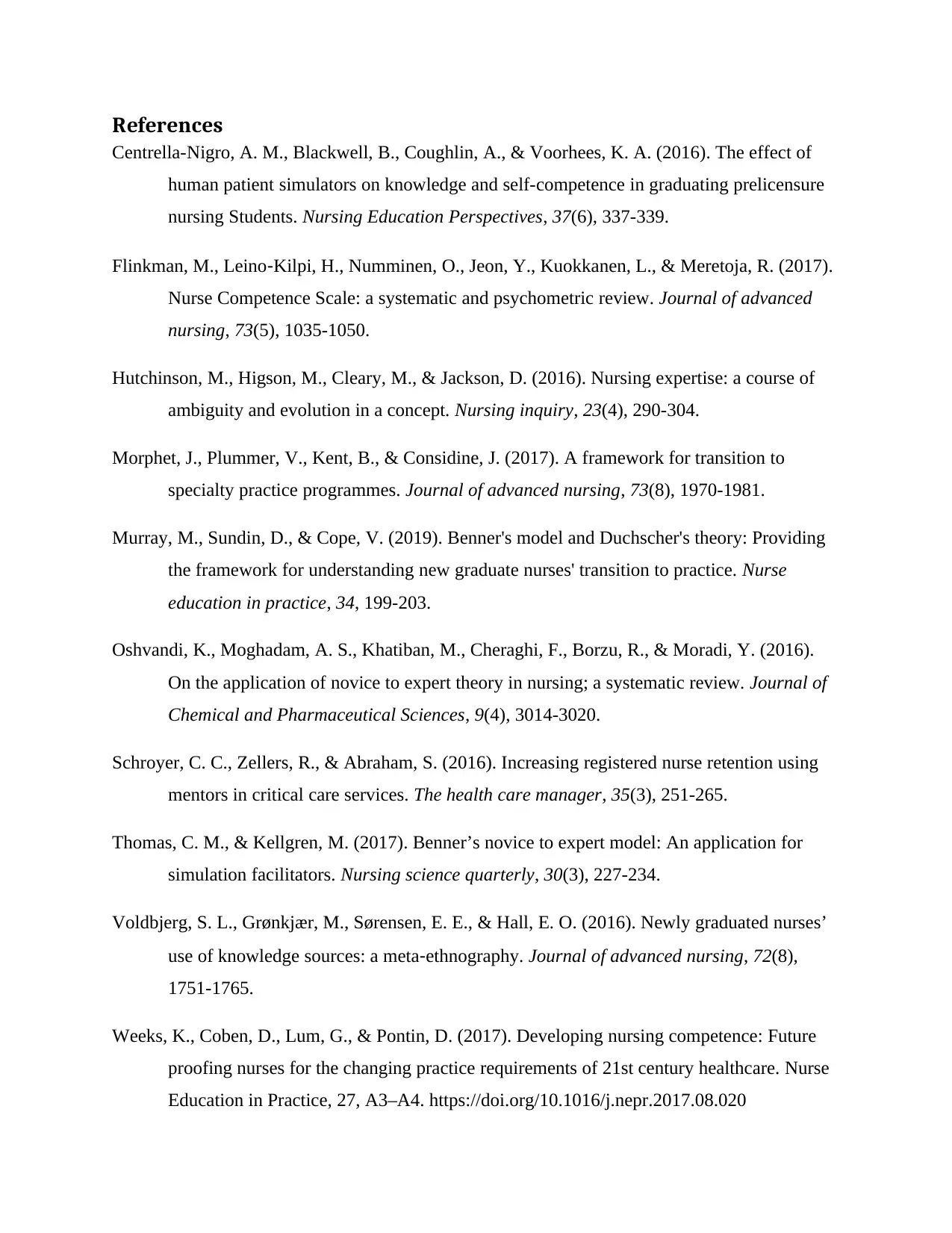
References
Centrella-Nigro, A. M., Blackwell, B., Coughlin, A., & Voorhees, K. A. (2016). The effect of
human patient simulators on knowledge and self-competence in graduating prelicensure
nursing Students. Nursing Education Perspectives, 37(6), 337-339.
Flinkman, M., Leino‐Kilpi, H., Numminen, O., Jeon, Y., Kuokkanen, L., & Meretoja, R. (2017).
Nurse Competence Scale: a systematic and psychometric review. Journal of advanced
nursing, 73(5), 1035-1050.
Hutchinson, M., Higson, M., Cleary, M., & Jackson, D. (2016). Nursing expertise: a course of
ambiguity and evolution in a concept. Nursing inquiry, 23(4), 290-304.
Morphet, J., Plummer, V., Kent, B., & Considine, J. (2017). A framework for transition to
specialty practice programmes. Journal of advanced nursing, 73(8), 1970-1981.
Murray, M., Sundin, D., & Cope, V. (2019). Benner's model and Duchscher's theory: Providing
the framework for understanding new graduate nurses' transition to practice. Nurse
education in practice, 34, 199-203.
Oshvandi, K., Moghadam, A. S., Khatiban, M., Cheraghi, F., Borzu, R., & Moradi, Y. (2016).
On the application of novice to expert theory in nursing; a systematic review. Journal of
Chemical and Pharmaceutical Sciences, 9(4), 3014-3020.
Schroyer, C. C., Zellers, R., & Abraham, S. (2016). Increasing registered nurse retention using
mentors in critical care services. The health care manager, 35(3), 251-265.
Thomas, C. M., & Kellgren, M. (2017). Benner’s novice to expert model: An application for
simulation facilitators. Nursing science quarterly, 30(3), 227-234.
Voldbjerg, S. L., Grønkjær, M., Sørensen, E. E., & Hall, E. O. (2016). Newly graduated nurses’
use of knowledge sources: a meta‐ethnography. Journal of advanced nursing, 72(8),
1751-1765.
Weeks, K., Coben, D., Lum, G., & Pontin, D. (2017). Developing nursing competence: Future
proofing nurses for the changing practice requirements of 21st century healthcare. Nurse
Education in Practice, 27, A3–A4. https://doi.org/10.1016/j.nepr.2017.08.020
Centrella-Nigro, A. M., Blackwell, B., Coughlin, A., & Voorhees, K. A. (2016). The effect of
human patient simulators on knowledge and self-competence in graduating prelicensure
nursing Students. Nursing Education Perspectives, 37(6), 337-339.
Flinkman, M., Leino‐Kilpi, H., Numminen, O., Jeon, Y., Kuokkanen, L., & Meretoja, R. (2017).
Nurse Competence Scale: a systematic and psychometric review. Journal of advanced
nursing, 73(5), 1035-1050.
Hutchinson, M., Higson, M., Cleary, M., & Jackson, D. (2016). Nursing expertise: a course of
ambiguity and evolution in a concept. Nursing inquiry, 23(4), 290-304.
Morphet, J., Plummer, V., Kent, B., & Considine, J. (2017). A framework for transition to
specialty practice programmes. Journal of advanced nursing, 73(8), 1970-1981.
Murray, M., Sundin, D., & Cope, V. (2019). Benner's model and Duchscher's theory: Providing
the framework for understanding new graduate nurses' transition to practice. Nurse
education in practice, 34, 199-203.
Oshvandi, K., Moghadam, A. S., Khatiban, M., Cheraghi, F., Borzu, R., & Moradi, Y. (2016).
On the application of novice to expert theory in nursing; a systematic review. Journal of
Chemical and Pharmaceutical Sciences, 9(4), 3014-3020.
Schroyer, C. C., Zellers, R., & Abraham, S. (2016). Increasing registered nurse retention using
mentors in critical care services. The health care manager, 35(3), 251-265.
Thomas, C. M., & Kellgren, M. (2017). Benner’s novice to expert model: An application for
simulation facilitators. Nursing science quarterly, 30(3), 227-234.
Voldbjerg, S. L., Grønkjær, M., Sørensen, E. E., & Hall, E. O. (2016). Newly graduated nurses’
use of knowledge sources: a meta‐ethnography. Journal of advanced nursing, 72(8),
1751-1765.
Weeks, K., Coben, D., Lum, G., & Pontin, D. (2017). Developing nursing competence: Future
proofing nurses for the changing practice requirements of 21st century healthcare. Nurse
Education in Practice, 27, A3–A4. https://doi.org/10.1016/j.nepr.2017.08.020
⊘ This is a preview!⊘
Do you want full access?
Subscribe today to unlock all pages.

Trusted by 1+ million students worldwide

1 out of 7
Related Documents
Your All-in-One AI-Powered Toolkit for Academic Success.
+13062052269
info@desklib.com
Available 24*7 on WhatsApp / Email
![[object Object]](/_next/static/media/star-bottom.7253800d.svg)
Unlock your academic potential
Copyright © 2020–2025 A2Z Services. All Rights Reserved. Developed and managed by ZUCOL.





